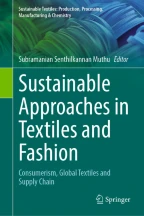
Ethical Fashion pertains to adoption of sustainable approaches at all levels of fashion supply chain spanning designing, production, retailing and purchasing. A range of social and environmental issues like working conditions, exploitation and regularization of wages for workforce, fair trade, sustainable production involving watchful utilization of natural resources, animal welfare and minimizing environmental impacts constitute the umbrella of ethical fashion. However, the greatest threat to ethical practices is inception of fast fashion credited to the globalization and industrialized methods of growing natural fibres. Consequently, the high street clothing becomes affordable and easily available to masses owing to quick and cheap, bulk production in bulk quantities. Ethical Fashion targets the glitches and adversities associated with operational practises of fashion industry like workforce exploitation, deleterious impacts to environment, the utilization of hazardous chemicals, dyestuffs and waste, exploitation and wasteful usage of natural resources and inflicting cruelty on animals for leather, fur, ivory, etc. The adoption of ethical fashion in design and production phase can play a pivotal role in averting the deleterious social and environmental adversities owing to stringent control on the whole supply chain from designing stage, material procurement, production process, to delivery and life cycle analysis of end product. Furthermore, major apparel and accessory brands sensing the consumers’ preferences and the worldwide clamour for sustainable and ethical fashion, have been adopting ethical approaches in order to adapt to changing scenario. The fashion brands in the pursuit to follow ethical principles practise pre-evaluation of suppliers for amenities, technical prowess, product quality, customer service, innovation and compliance of codes of conduct and contracts for rating the suppliers on above parameters. Moreover, the design process is positively impacted as brands improve procurement practices at their end, reducing their total costs of introducing new styles to market, a fast style inception. The practices, if followed at the design stage, can lead to fewer supplier compliance violations, thus offering overall benefits to the design process. Furthermore, designers can play a vital role in diverting textile waste away from landfill and prolonging the garment and accessory’s life cycle by switching over to reusable textile waste, trims and notions, while designing some of their upcoming style lines. The scrap, textile waste and discarded clothes, trims and accessories, if used strategically and reformed into new apparel and accessory styles, not only add to profit margins for those involved in the supply chain but also enables the process to achieve sustainability. Accordingly, a gamut of fashion designers and brands namely Anita Dongre, Sandra Sandor, Katie Jones, Maggie Marilyn, Gautam Gupta, Paromita Bannerjee and Thief & Bandit, The Little Market, Patagonia, Remake score, Love Stories Bali, Nicora, Doodlage, Pero, Grass roots, Nicobar, respectively have been trailblazers in creating apparel and accessory line based on recycling, reuse and upcycling principles. Additionally, the newly introduced concepts of capsule fashion, convertible garments and gender fluid clothing are all supporting the ethical commitments of the designers and manufacturers. The chapter presents a detailed review on ethical fashion as a pathway for social and environmental well-being.
This is a preview of subscription content, log in via an institution to check access.
eBook EUR 74.89 Price includes VAT (France)
Softcover Book EUR 94.94 Price includes VAT (France)
Hardcover Book EUR 137.14 Price includes VAT (France)
Tax calculation will be finalised at checkout
Purchases are for personal use only